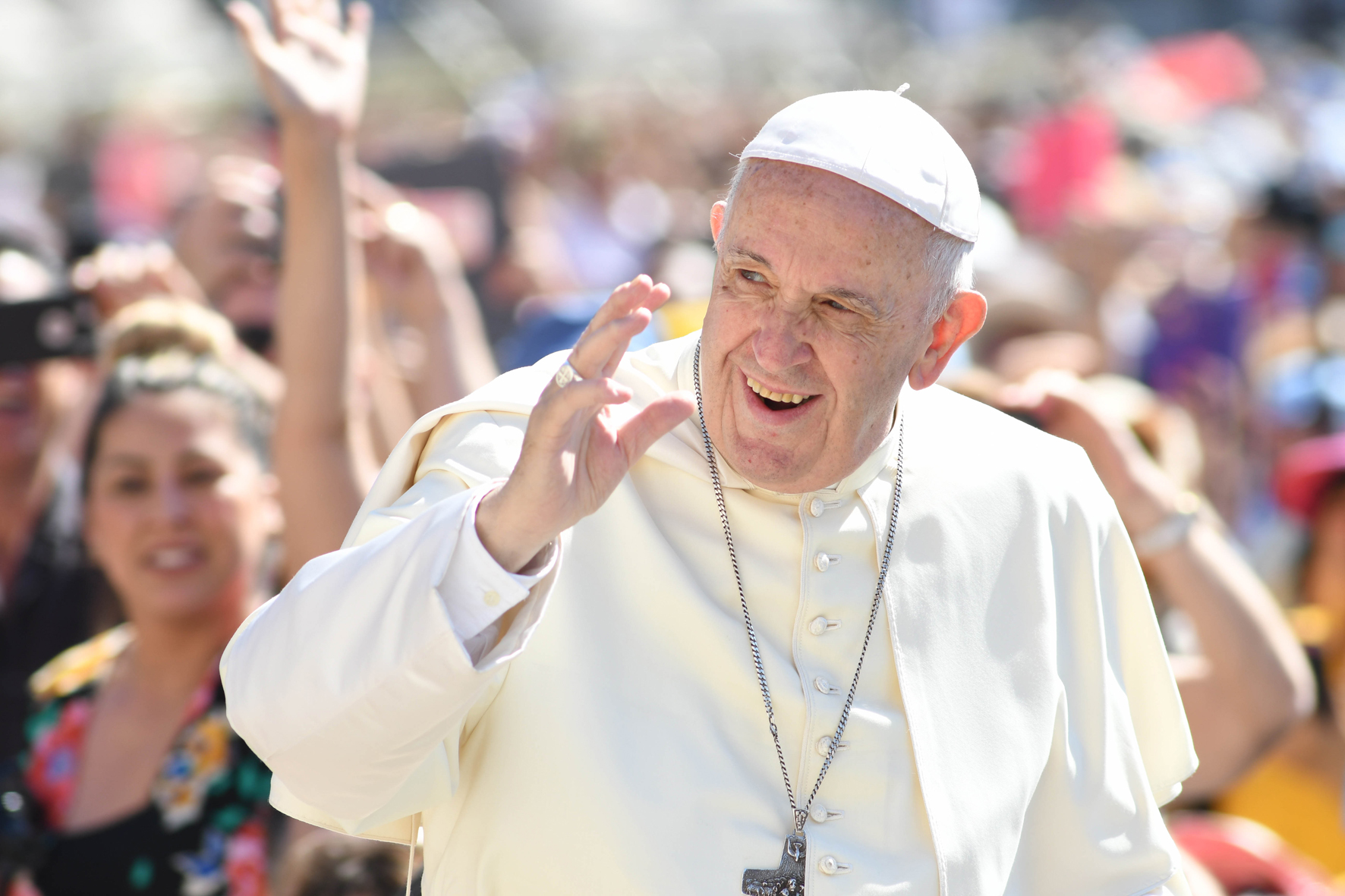APOSTOLIC JOURNEY
The historical context of the Church in Bulgaria and Macedonia encompasses a Communist past in the two Balkan Countries which destroyed ecclesial structures and banned all forms of apostolate. “We experienced a harsh period of atheism”, said Msgr. Christo Proykov, apostolic Exharch, President of Bulgarian Bishops: “We restarted from nothing. We had to rebuild the structures and gradually new vocations to the priesthood and consecrated life started to flock in”

From May 5 to 7 Pope Francis will visit the Catholic communities of Bulgaria and Macedonia: a unique and special event. Although these realities are numerically small (approximately 70 thousand faithful in Bulgaria and 20 thousand in Macedonia) local Catholics have cherished their faith throughout the centuries. To them, meeting Pope Francis represents an opportunity to confirm them in their faith and pray for peace in the Balkans and in the world.

The Communist past. The historical context of the Church in Bulgaria and Macedonia encompasses the Communist past of the two Balkan Countries which destroyed ecclesial structures and banned all forms of apostolate. “We experienced a harsh period of atheism”, said Msgr. Christo Proykov, apostolic Exharch, President of Bulgarian bishops: “We restarted from nothing. We had to rebuild the structures and gradually new vocations to the priesthood and consecrated life started to flock in.” There are three Catholic dioceses in Bulgaria, two of Latin rite: the diocese of Sofia -Plovdiv and that of Nicopolis, and the Exarchate for Catholics of Byzantine-Slavic Rite. “We place great effort in our service to families and young people”, the prelate said, in the belief that education in the Christian family is an investment for the future of the Church in the Country. “We pray for our martyrs shot to death during the communist regime, that include our Blessed Catholic Bishop Msgr. Eugenio Bossilkov and three Assumptionist Fathers.” Saint John XXIII, Pope Roncalli, who lived ten years in Bulgaria serving as Apostolic Visitator, is another important protector of Catholics in Sofia. “The visit of Pope Francis – said Mons. Proykov – will be guided by the motto ‘Pacem in terris’, a reference to the encyclical of John XXIII bearing the same name. The late Pope is highly esteemed by the Bulgarians for the great love that he always nourished for our homeland and for his tireless dedication to interreligious dialogue in the Country.”
 A land of encounter. Orthodox, Catholics, Muslims, Protestants, Armenians and Jews have been living together in peace in Bulgaria for centuries. “The spirit of tolerance and acceptance of our fellow others – said Bishop Proykov – was our contribution to the EU, which Sofia joined in 2007.” Despite the progress brought into the Country by European membership, many young people have decided to emigrate to Western Europe. The bishop said that “every Bulgarian family has relatives abroad. This also affects pastoral ministry.” “Young people – who look forward to every ecclesial appointment, national meetings, the WYDs and this year also the Pope’s visit, with deep joy – represent the hope of Bulgarian Catholics today.”
A land of encounter. Orthodox, Catholics, Muslims, Protestants, Armenians and Jews have been living together in peace in Bulgaria for centuries. “The spirit of tolerance and acceptance of our fellow others – said Bishop Proykov – was our contribution to the EU, which Sofia joined in 2007.” Despite the progress brought into the Country by European membership, many young people have decided to emigrate to Western Europe. The bishop said that “every Bulgarian family has relatives abroad. This also affects pastoral ministry.” “Young people – who look forward to every ecclesial appointment, national meetings, the WYDs and this year also the Pope’s visit, with deep joy – represent the hope of Bulgarian Catholics today.”
The Pope in Sofia and Rakovski. The program of Francis’ visit has not been announced yet. However, the Pope will definitely visit Sofia, the capital city, and Rakovski, the only Bulgarian city with a Catholic majority population. “There is great joy and enthusiasm among the faithful. Preparations are in full swing”, Proykov remarked. A “special prayer” for the Pope’s visit, in harmony with the “Pacem in terris” motto, is being said in all parishes. The Apostolic Exharch expressed the wish that the last words of this prayer may come true: “Let us show with our life that peace on earth is possible.”
In Macedonia. Also in Macedonia Catholics are preparing for the arrival of Pope Francis with prayers. In the young Balkan Country there are 15thousand Catholic of Byzantine rite and 5 thousand of Latin  rite, guided by the same pastor: Msgr. Kiro Stoyanov, Bishop of Skopje for the Latin Catholics and eparch of Strumitza-Skopje for those of Eastern Rite. Skopje, the capital city, is the only destination of the papal visit to Macedonia. “The Holy Father will visit the hometown and the parish where Mother Teresa was born”, said Msgr. Stoyanov. “The Pope’s presence here is a gift from God not only for Catholics but also for the faithful of other confessions and for all Macedonian people.” In his view, the visit “will be a great encouragement to the faithful in Macedonia, as well as an opportunity to be confirmed in their faith, in adherence to the Successor of Peter.” This journey – he added – “will send a sign of hope and peace to every Macedonian.” “We must transform this occasion into an opportunity of peace and cooperation among the different members of society for the good of the Country.”
rite, guided by the same pastor: Msgr. Kiro Stoyanov, Bishop of Skopje for the Latin Catholics and eparch of Strumitza-Skopje for those of Eastern Rite. Skopje, the capital city, is the only destination of the papal visit to Macedonia. “The Holy Father will visit the hometown and the parish where Mother Teresa was born”, said Msgr. Stoyanov. “The Pope’s presence here is a gift from God not only for Catholics but also for the faithful of other confessions and for all Macedonian people.” In his view, the visit “will be a great encouragement to the faithful in Macedonia, as well as an opportunity to be confirmed in their faith, in adherence to the Successor of Peter.” This journey – he added – “will send a sign of hope and peace to every Macedonian.” “We must transform this occasion into an opportunity of peace and cooperation among the different members of society for the good of the Country.”
A growing community. “It is no coincidence that Pope Francis has recently recognized the progress in faith made by the Catholic Church in Macedonia – added the bishop of Skopje – by proclaiming the Elevation of the apostolic exarchate for Catholic faithful of Byzantine rite.” Msgr. Stoyanov was appointed as the first eparchial bishop. In his opinion, “the gesture of the Pope is an encouragement to the Macedonian faithful, this “small flock”, “to cherish the faith of their forefathers and bear witness to the Gospel through coherent Christian life.” Msgr Stoyanov recalled the history of the Catholic Church in this land, “steeped in suffering and martyrdom, but also the deep commitment of the clergy and of the laity to remain united to the Church of Rome.”
 “Do not be afraid, small flock!” The motto for the visit to Macedonia is “Do not be afraid, small flock!” and, while from the outside 20 thousand Catholics may seem few, there is great activity going on behind these small numbers, fostered by a new generation of young local priests. “Our community is very close-knitted and dynamic thanks to the close cooperation of priests, religious men and women and lay faithful” the bishop said, quoting the words of Benedict XVI: “What’s important is not our numbers but our actions.” Mons. Stoyanov assured that “in Macedonia Pope Francis will find a Church that tries to meet the challenges of the men and women of today, a Church that wants to reach out to peripheries and welcome everyone, no one excluded, a Church open to ecumenism and interreligious dialogue regardless of national, religious, ideological or political diversity.”
“Do not be afraid, small flock!” The motto for the visit to Macedonia is “Do not be afraid, small flock!” and, while from the outside 20 thousand Catholics may seem few, there is great activity going on behind these small numbers, fostered by a new generation of young local priests. “Our community is very close-knitted and dynamic thanks to the close cooperation of priests, religious men and women and lay faithful” the bishop said, quoting the words of Benedict XVI: “What’s important is not our numbers but our actions.” Mons. Stoyanov assured that “in Macedonia Pope Francis will find a Church that tries to meet the challenges of the men and women of today, a Church that wants to reach out to peripheries and welcome everyone, no one excluded, a Church open to ecumenism and interreligious dialogue regardless of national, religious, ideological or political diversity.”